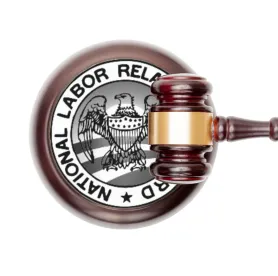In a decision that affects both union and non-union employers, the National Labor Relations Board (NLRB or Board) has taken what is likely the first step toward reining in the expanded scope of what the Obama-era Board considered “protected, concerted activity” under the National Labor Relations Act (NLRA).
In Alstate Maintenance, the NLRB overturned its WorldMark by Wyndham decision, which held that an individual employee’s complaint made in a group setting was, per se, concerted activity. 367 NLRB No. 689 (January 11, 2019). The Board noted the case had “blurred the distinction between protected group action and unprotected individual action” and clarified that “individual griping does not qualify as concerted activity solely because it is carried out in the presence of other employees and a supervisor and includes the use of the first-person plural pronoun.”
Although Alstate Maintenance provides some welcome clarification for employers, properly identifying protected, concerted activity still requires a thorough and detailed analysis. In addition to protecting employees who engage in union activities, Section 7 of the NLRA protects employees’ right to engage in “concerted activities for the purpose of . . . mutual aid or protection,” regardless of whether they are union-related.
In determining whether employee activity is entitled to protection, the NLRB considers the following:
-
Whether the activity is “concerted”;
-
Whether the activity is “for mutual aid or protection”; and
-
Whether the activity has lost the protection of Section 7 by its means or objectives.
The NLRB in Alstate Maintenance clarified that—in addition to situations in which two or more employees act together—a single employee may engage in “concerted” activity if he or she is acting “with or on authority of other employees, and not solely by and on behalf of the employee himself.” An employee’s actions can be “concerted” if he or she “brings truly group complaints to the attention of management” or “seek[s] to initiate or to prepare for group action.” Such concerted activities become “protected” if they relate to the terms and conditions of employment, such as pay or working conditions.
Examples of protected, concerted activity may include:
-
Employees wearing buttons advocating a particular cause;
-
Employees making statements that appear to attack the employer’s reputation or a member of management, including on Facebook or other forms of social media;
-
Employees complaining about employer work policies or terms and conditions of employment; and
-
Employees handing out leaflets in non-working areas during non-working time, including parking lots, while off duty.
While many employers are able to identify protected, concerted activity, missteps often occur when the employee’s actions also violate workplace conduct policies, such as name-calling and the use of profanity. The NLRB has a surprisingly high standard for determining an employee’s protected, concerted actions have lost the protection of Section 7. This generally occurs when employees engage in reckless or malicious behavior, such as sabotaging equipment, threatening violence, spreading lies about a product, or revealing trade secrets. The NLRB often finds other forms of offensive or profane conduct to be protected. For example, the NLRB has held that Section 7 protection applied even when the employee called his supervisor a “NASTY MOTHERF**ER” in a Facebook post.
Healthcare employers should be especially wary of the issues unique to the industry. Restrictions on solicitation, distribution, and wearing certain union apparel outside of immediate patient care areas may violate the NLRA, despite the healthcare employer’s legitimate interest in limiting these activities. The Board has even held that employees of contractors and vendors, such as nurses, nurses’ aides, and food service and environmental service workers, may have a right to handbill on company property in non-working areas, and tell the media that a healthcare facility’s staffing levels have an adverse effect on patient care.
To avoid potential unfair labor practice charges, both union and non-union healthcare organizations should be familiar with what the Board considers protected, concerted activity and lawful responses to such activity. Employers are well advised to weigh employment decisions that may involve protected, concerted activity carefully and to consult experienced labor counsel when necessary.



 />i
/>i

